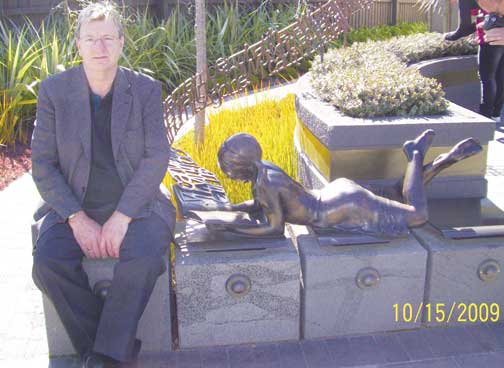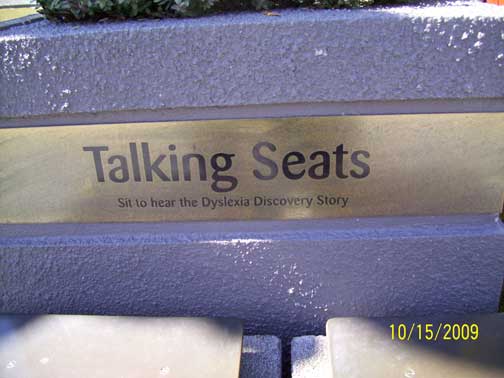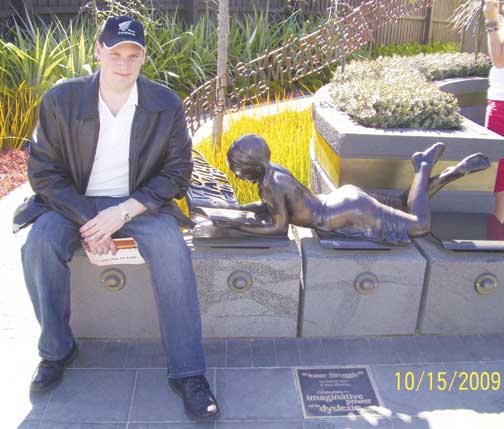


SERVICES
Tuesday December 8, 2009
G'Day From Downunder
Our correspondant sits on the talking seat (Mike Bowen) It's cuppa tea time again so get the kettle on; I've just got back from a business stint in New Zealand so it's been a few drinks ago since we had a chat. I've said many, many times in past articles that life throws up many surprises and I suppose that's what makes the journey of life so wondrous and exciting. Coincidences or faith, I'm never really sure which way to call it; I'm dyslexic and so is one of my sons, Emmett. In my childhood it was a major problem as little was known about the condition and schools treated dyslexic students as fools or children who were slow to learn or as students who didn't want to learn. I can assure you nothing is further from the truth. I was blessed the day Emmett was born; I was so lucky to have a son who was dyslexic like myself at least I was able to recognise the condition and speak to his school teachers when he became of school age and I can tell you it was a job-and-a-half in itself. Still, after all those years no one seemed to understand how to deal with the condition. It had been a constant battle all through his school years and more so through exam times so where am I leading you? Did I say coincidence or faith earlier? You figure it out; I should first say I have been to New Zealand a dozen or so times in the last two years but this time Emmett travelled with me. While in New Zealand, this time in the beautiful city of Christchurch, having a two hour break between appointments Emmett was doing some study for his financial planning exams and I decided to take a wander up the street from the hotel to get some fresh air. After about six or seven minutes walking I noticed my shoe lace had come loose so I put my foot up on one of four brass seats outside number 21 Worchester Boulevard... I was quite taken back when the seat started to talk to me. Before you run off and think I've gone totally nuts please hear me out. I have attached a picture showing you the talking seats I had found what I have been looking for all my life, a place where dyslexia is normal. I sat on the talking chair and the angel voice of a little girl told her story of the struggle she had with dyslexia. I had found the dyslexia foundation of New Zealand. To me this was better than finding a winning lottery ticket when the tears of joy stopped flowing I rang Emmett to get himself down here as quick as he could. On his arrival we were like two children doing ring a rosy, we were ecstatic! Coincidence or faith that I just happened to wonder up the street? Coincidence or faith that my business partner suddenly got ill and couldn't travel with me? Coincidence or faith that Emmett took his place on this trip? Sometimes I think things are meant to be and so was this now after all those years when you look at the company we are in we both feel privileged to be dyslexic and not just one of the ordinary. Let me throw some light on the subject for those of you who may not understand what dyslexia is. I will quote from the wonderful manual that the foundation kindly hands out free - it's a must read. What Is Dyslexia?
The plaque on the Dyslexia Foundation's 'Talking Seat' (Mike Bowen) Dyslexia is an alternative way of thinking. It is hereditary, and has genetic causes. Brain research including groundbreaking work from Auckland University shows that while most of us use the 'verbal' left side or our brain to understand words, dyslexic people use the 'pictorial' right side - making them slower to process and understand language, but stronger in creative areas like problem solving, empathy, leadership and lateral thinking. Effective action unlocks potential and allows dyslexic individuals to access and use their talents. These findings are confirmed and complemented by overseas research which focuses on the creative strengths which dyslexia can offer rather than viewing dyslexia as a literacy deficit. In our culture, it is assumed that if you are good with words, you are also highly intelligent and if you struggle with words you must not be so smart; but the experience of dyslexia shows this assumption to be false. Dyslexia impacts much more than literary alone. While the most immediate characteristic is a problem in decoding words and their meanings this is still only one aspect of a broader spectrum of difficulties such as auditory and visual perception, planning and organising, motor skills, short-term memory and concentration. Some of these can make it especially challenging for individuals to follow multiple instructions turn thoughts into words and finish work on time. Unlocking The Potential Of DyslexiaThe upside of dyslexia is the ability to perceive the world from many perspectives, allowing special talents and skills to flourish in fields such as invention, the arts, design, engineering, and entrepreneurship. Dyslexia must be supported in education and in the workplace and this often requires specific interventions as well as awareness and understanding. It is also important that dyslexic individuals are able to take responsibility for their unique way of thinking turning it from an obstacle into an advantage. Successful dyslexics draw on their strengths to his their targets in life. Famous dyslexics who have unlocked their potential include historical figures as diverse as Leonardo da Vinci, Agatha Christie and John Lennon and international celebrities such as actors Tom Cruise and Robin Williams, entrepreneur Richard Branson, supermodel Jerry Hall and actress Keira Knightley. In New Zealand, creative leaders like Academy Award winner Richard Taylor, motivational speaker Billy Graham, renowned hair stylist Mike Hamel and the late maverick motorcycle designer John Britten all embraced this learning difference to become leaders in their field. The Importance Of Action
Facts About Dyslexia
Emmett Bowen sitting on talking seat (Mike Bowen)
Myths About Dyslexia
How Many People Are Affected By Dyslexia?An estimated one in ten New Zealanders are dyslexic, including over 70,000 schoolchildren. Dyslexia's greatest difficulty is self-esteem. Children begin school full of curiosity and eagerness to learn but can quickly become disillusioned by unexpected failure in the classroom. If not addressed correctly dyslexia can lead to alienation and disenfranchisement and put youth at risk, fuelling depression and anti-social behaviour. Overseas, British, American and Swedish research all suggests 30-52% of prisoners are dyslexic, and there is no reason to suggest the New Zealand incidence would be any different. Fundamentally, all of us are affected by dyslexia, which is why addressing dyslexia in the classroom and through into the workplace is a very effective way of improving life for the whole community. The contact for the foundation is: info@dfnz.org.nz I truly hope that this bit of information will help to change someone's life out there who is going through what Emmett and I went through. Now it's time to step out into the light and join the elite! Until I talk to you again soon. Be good to those who love you and Slainte from Downunder! Conscience or faith? What do you think? Let me know at mike@globefins.com.au |
CURRENT ISSUE

RECENT ISSUES


SYNDICATE
[What is this?]
POWERED BY

HOSTED BY

Terms of Service | Privacy Policy
Website Design By C3I








